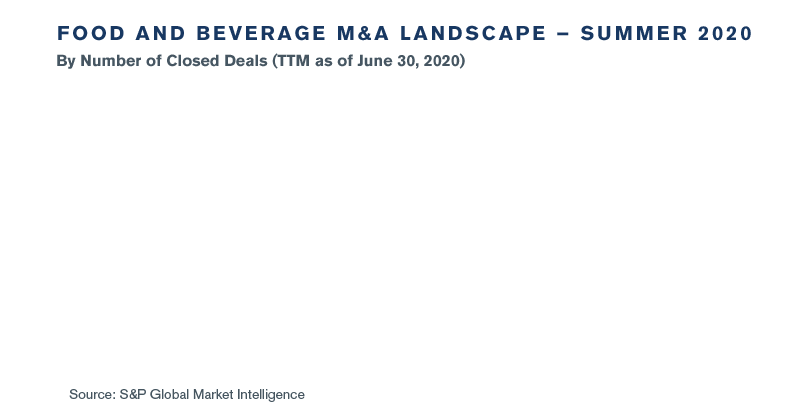Food and beverage M&A deal activity in the U.S. and Canada saw a strong downtick in the trailing twelve months (TTM) ending June 30, 2020, with only 266 deals closing over the period.
The second quarter of 2020 did not produce any landmark transactions, except for the revision of the divestiture of a portfolio of wine and spirit brands by Constellation Brands to E. & J. Gallo Winery for USD 1 billion (bn). The transaction was reannounced for a second time on May 28, 2020, reflecting further amendments due to concerns brought forward by the Federal Trade Commission.

Although deal activity slowed in Q2 2020, M&A activity in the food and beverage sector is still predominately driven by strategic buyers (including companies primarily owned by private equity investors), with strategic transactions representing 83% of total deal value over the TTM. Of the 266 deals closed over the TTM, 203 (76%) were completed by privately owned buyers.
Overall deal volume in the TTM decreased 15%, relative to the 313 deals closed over the TTM ending June 30, 2019.
The COVID-19 pandemic has resulted in shutdowns and shelter-in-place orders across North America, impacting economic activity across all sectors. Food and beverage companies have dealt with an increasing number of new challenges, such as maintaining supply chains, ensuring employees are healthy and safe, building working capital and having adequate access to financing. Many buyers in the food and beverage sector have shifted their focus away from M&A and other strategic initiatives. Strategic buyers focused on steering their businesses through the chaos, financial buyers prioritized their current portfolio companies, and lenders became more conservative. With many food and beverage companies adopting to the “new normal,” M&A activity will likely accelerate in the second half of 2020, especially for retail and direct-to-consumer companies that have successfully navigated through the last few months. Additional deal flow may also come from auction processes that were put on hold in March due to COVID-19 related disruptions.
Sources Capital IQ as of June 30, 2020
Note M&A deal count is defined by a list of subsectors viewed as the best representation of the industry
Corporate Finance and Restructuring
M&A advisory, restructuring and insolvency, debt advisory, strategic alternatives, transaction diligence and independent financial opinions.
Consumer Investment Banking
Consumer, Retail, Food and Restaurant expertise for middle-market M&A transactions.
Distressed M&A and Special Situations
Kroll professionals have advised hundreds of companies, investors and other stakeholders at all stages of distressed transactions and special situations.
Transaction Advisory Services
Kroll’s Transaction Advisory Services platform offers corporate and financial investors with deep accounting and technical expertise, commercial knowledge, industry insight and seamless analytical services throughout the deal continuum.
Fairness and Solvency Opinions
Duff & Phelps Opinions is a global leader in Fairness Opinions and Special Committee Advisory, ranking #1 for total number of fairness opinions in the U.S., EMEA (Europe, the Middle East and Africa), Australia and Globally in 2023 according to LSEG (FKA Refinitiv).
Private Capital Markets – Debt Advisory
Kroll has extensive experience raising capital for middle-market companies to support a wide range of transactions.
Financial Sponsors Group
Dedicated coverage and access to M&A deal-flow for financial sponsors.





